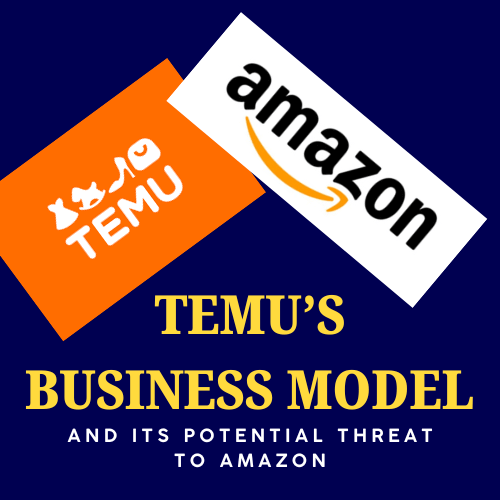In the world of e-commerce, Amazon has long been the undisputed king. However, a new player, TEMU, has rapidly emerged, raising questions about how it could impact Amazon’s dominance. In this blog, we’ll take a deep dive into TEMU’s business model and examine whether it poses a genuine threat to Amazon, specifically for sellers and customers.
What is TEMU?
TEMU is an online marketplace similar to Amazon, offering a vast range of products at incredibly competitive prices. Launched by Pinduoduo, one of China’s biggest e-commerce giants, TEMU operates primarily on a low-price, high-volume model. It draws its strength from an extensive network of suppliers, particularly in China, and uses economies of scale to keep prices low.
With TEMU’s expansion into international markets, sellers, particularly on Amazon, need to assess how its presence may influence e-commerce dynamics.
TEMU’s Business Model: What Makes It Different?
TEMU’s success stems from key differentiators that make it a compelling alternative to traditional e-commerce platforms like Amazon:
- Supplier-Centric Model: TEMU connects sellers directly with manufacturers, particularly in China, bypassing many middlemen. This allows the platform to offer extremely low prices, which can undercut other marketplaces.
- Cost Leadership Strategy: While Amazon relies on convenience, fast shipping, and customer loyalty, TEMU’s core selling point is price. Its ability to offer rock-bottom prices challenges Amazon, especially for price-sensitive customers who prioritize savings over quick delivery.
- Group Buying: TEMU introduces innovative purchasing options, like group buying, where customers can team up with friends to get even further discounts on products. This model incentivizes bulk orders, helping drive massive volume sales.
- Heavily Discounted Shipping: Another major advantage is the way TEMU handles international shipping. By leveraging Pinduoduo’s logistics expertise and China’s export infrastructure, TEMU offers extremely low shipping rates—even on small orders, a significant competitive advantage over Amazon.
The Threat to Amazon: What Sellers Should Consider
Although Amazon is still the leader in e-commerce, TEMU represents a new, formidable competition that poses several threats:
- Price Wars: TEMU’s low prices mean that Amazon sellers could face increased price competition. Sellers who rely on lower-priced items or bargain shoppers may need to adapt or even rethink their pricing strategies to stay competitive.
- Supplier Shifts: If TEMU becomes more attractive to suppliers (thanks to its low fees and minimal bureaucracy), it could lead to a supply chain shift. Manufacturers may favor selling through TEMU, giving the platform a unique edge in offering a wider variety of products.
- Customer Loyalty and Experience: While Amazon is known for its customer loyalty programs like Prime, TEMU focuses more on price-conscious buyers. Sellers must decide how to differentiate their products and services to attract and retain customers, despite TEMU’s price-focused approach.
- Amazon’s Response: Historically, Amazon has been quick to adapt to threats. If TEMU continues to grow, Amazon may start adjusting its pricing, boosting its supply chain innovations, or even expanding into similar business models to compete.
How Amazon Sellers Can Stay Ahead
As competition between Amazon and TEMU heats up, sellers on Amazon need to adapt their strategies to avoid losing market share. Here are a few tips:
- Focus on Branding: Price wars can be tough, but by building a brand, sellers can create a loyal customer base that values their unique products or superior quality. Branding also creates a sense of trust that price-based platforms like TEMU might not be able to match.
- Optimize Listings: As competition increases, sellers must invest in listing optimization to ensure that their products stand out. High-quality images, compelling titles, optimized keywords, and localized content are essential for converting traffic into sales.
- Leverage Amazon’s Strengths: Focus on the strengths of Amazon’s platform, such as its reliable delivery services and customer trust. Offering value-added services like fast shipping, superior customer service, and easy returns can help offset the allure of lower prices on platforms like TEMU.
- Explore Niche Markets: TEMU is likely to dominate the budget-friendly, high-volume product categories. Sellers can thrive by targeting niche markets where price is less of a factor and where specialization or expertise is highly valued.
Conclusion: Should Amazon Be Worried?
While TEMU’s rise certainly poses new challenges, it also presents opportunities. Sellers who understand the differences between the platforms and adapt their strategies accordingly will not only survive but thrive in this increasingly competitive landscape.
As a specialized agency in Amazon listing optimization, translation, and localization, MarginBusiness is here to help you navigate this evolving market. Whether you’re concerned about the growing competition or just looking to improve your sales, we can assist with all aspects of listing management, keyword optimization, and advertising strategies to ensure you stay ahead of the curve.
To learn more, visit MarginBusiness and let us help you maintain your competitive edge in this rapidly changing e-commerce world!

